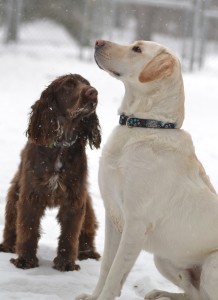Lost or Found: What To Do With Missing Dogs
 Keshet recognizes the week of April 19-25 as National Pet ID week. Millions of beloved pets in North America are lost every year and, sadly, the Ontario SPCA estimates that over 75% of lost pets never make it home. We believe that these astounding numbers have the potential to decrease over time as more and more people realize the importance of pet identification. Losing a pet is extremely stressful. The unanswered questions of why they left, where they could be, how they are and will they return, are enough to haunt any pet owner. Finding a stray pet also carries its share of stresses as the search for the pet’s owners can be arduous. For each of these situations, we have included a guideline that may be helpful. Below are some tips on what to do should you, or someone you know, lose a pet or find one that has strayed from home.
Keshet recognizes the week of April 19-25 as National Pet ID week. Millions of beloved pets in North America are lost every year and, sadly, the Ontario SPCA estimates that over 75% of lost pets never make it home. We believe that these astounding numbers have the potential to decrease over time as more and more people realize the importance of pet identification. Losing a pet is extremely stressful. The unanswered questions of why they left, where they could be, how they are and will they return, are enough to haunt any pet owner. Finding a stray pet also carries its share of stresses as the search for the pet’s owners can be arduous. For each of these situations, we have included a guideline that may be helpful. Below are some tips on what to do should you, or someone you know, lose a pet or find one that has strayed from home.
If You Lose a Pet
- Contact your local SPCA, Humane Society, animal pound and all of the rescue organizations in your area with a description of your pet.
- Have a clear and recent picture available to post on-line, on flyers, and to show people.
- Let your neighbours or business owners in the area know that your dog has been lost.
- Make posters to place in establishments and various places throughout your area. Be sure to include information regarding his/her colour, breed, distinguishing characteristics, etc.
- Check on-line websites and social media forums regularly and post a picture/description of your pet. (In Ottawa, for example, there is the Ottawa and Valley Lost Pet Network).
- Beware of pet-recovery scams that are after a reward. Be sure to get details and pictures before exchanging money or, better yet, set up a place to meet the individual and pet.
If You Find a Lost Pet
- Contact the SPCA, Humane Society, animal pound and rescue organizations in your area with a description of the pet.
- Take a clear picture of the pet that you have found.
- Call around and see if a veterinarian or rescue organization in your area has a scanner to check for a microchip.
- If the dog is wearing a collar, check for tags that would contain contact information and try giving them a call.
- Check on-line sources, newspapers and local establishments for any “Lost” dog or cat posters.
- Do not release the pet to just anyone claiming the animal is theirs, try to get them to give as many details as possible.
 In both instances, the most important thing is getting the word out there. Check often, post everywhere, and call everyone. These days there are several tools that can be helpful to those looking for either lost pets or the owners of lost pets. The internet, especially social media, can be a integral part of the finding process.
In both instances, the most important thing is getting the word out there. Check often, post everywhere, and call everyone. These days there are several tools that can be helpful to those looking for either lost pets or the owners of lost pets. The internet, especially social media, can be a integral part of the finding process.
Here are a few additional things pet owners can do that will help to ensure their pet’s safety and speedy return if lost.
* Microchip pets
* When outdoors, ensure your pet is wearing a collar with ID tags attached
* Take regular pictures of your pet, especially if they are in the growing stage
The unfortunate reality is that local pounds and humane societies will only keep pets for a short time before they are released for assessment, adoption and even euthanasia. At Keshet, we believe in taking preventative action against missing pets by offering to microchip them. Anyone interested in having their pet microchipped is able to book an appointment by contacting us at inquiries@keshetkennels.com. Also, in an effort to reunite owners with lost pets, we offer free microchip scanning to anyone that has found a stray pet.
Pets go missing for any number of reasons. Making sure all of your pets are equipped with proper identification is a fundamental part of responsible pet ownership. Providing your pet with proper ID will help to ensure your pets stay at home where they belong.


Nice information. It can be very depressing if a pet gets lost, however, one should always be cautious to prevent such problems. I feel microchips works best for pet identification compared to tags & IDs and chips also give health & vaccination updates. This is possible when proper registration details are given to sellers.